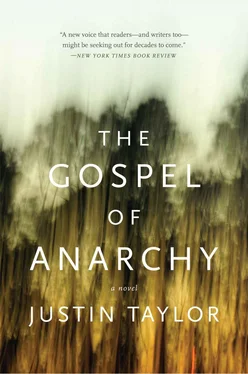“Are you sure there’s enough to go around?” I asked. Thomas raised an eyebrow at me and hefted the white bag up.
“You’re kidding,” he said. “This’ll feed the whole house for two days.”
I took the biggest bite I could and stood there dumbly, chewing and being watched. It was drier than I’d thought it would be, and sucked up the moisture in my mouth. I kept chewing. It tasted okay, other than not being an especially impressive falafel sandwich, which of course, having been a customer there, was no more and no less than I already knew. No rancid aftertaste, indeed no hint at all of its having turned. The punks were right. It was fine. I swallowed.
We went back out the alley-street the way I’d come, but we crossed University instead of turning onto it. We went into the northeast part of town, up a few sleepy blocks, and only then took our left turn, around the back of El Indio, the drive-thru Mexican place that they told me had a dumpster also ripe for the picking. I nodded, as if filing this information away for later use. What could I say? We crossed Thirteenth Street, over into the northwest, the student ghetto, my neighborhood, and apparently theirs as well.
I saw the squat hulk that was Gator Glen Apartments, where I lived. It was a four-story building on a block-size plot, surrounded by single-family homes and duplexes. It was a monstrosity, I realized, a gray-white blot like a thrush in the throat of the night. I thought of the food in my refrigerator, and the beer. We could swing by, pick up what I had, and bring it all over to Thomas’s, make the feast that much sweeter. But that would mean bringing them to my apartment, opening up to their judgment my sorry life. I knew what they would think of my white walls and white carpet and white counters. It was a sterile place, barely a home, and in a way I had always known that. I had moved there straight out of the dorms, and the truth was that the apartment was largely indistinct from a dorm. It had come furnished, all-inclusive. Moving there had been the beginning of my slow drift out of the world. I saw that now.
But still, the food. And if not the food, the beer. They would appreciate the beer. They were scroungers and would excuse anything on account of the beer. So maybe it was less about them than about me — not what they could accept, but what I could bear to have them know.
We walked on, and a block later turned north again. The building fell out of my sight line, and I focused on the oak limbs high overhead, crisscrossing over and under each other, so you couldn’t be certain where one tree left off and another began. The whole mass swayed in the night breeze, a single solid billowing thing. I had fallen behind my new friends. I quickened my pace and caught up. It was only another block and a half before we reached their house.
The yard was dark and large, a sea of loose dirt and fallen leaves wrapping around the small house on all sides. It was a single-story cinder-block home, with flaking paint and a front porch with torn screens. I could see lights on in the living room. There was a chain-link fence with a latch gate, from which was hung a broken plank of finished wood, perhaps a former bookshelf, on which a single word had been painted in loping strokes of blue: Fishgut . An orange VW microbus was parked in the yard, like an island in the leaf-sea. A red extension cord snaked out one of the bus’s open windows, ran clear across the yard and into a living room window that had been left open just wide enough to admit the cord. Liz opened the fence gate and held it for me. Thomas closed it behind us. I made my way up the walk, or what I believed was the walk, though all I could make out beneath my feet were more dead leaves. The front door was ajar: an inch of light. Liz swung it wide.
A pair of aging hippies were on the floor in the middle of the living room, even though there were two couches and nobody sitting on either one. A girl had her legs curled up under herself on a beat-up armchair. Her hair was the color of seawater, tucked behind her severally studded ears, though it stuck out in some places and was matted in others. She was reading a paperback book called Omens of Millennium . She put the book down splayed open on her knees and looked up at us. Her eyes were a warm brown, set close in her big round face. She had ruddy cheeks, a silver ring through her septum, and a smile that spread like a wonderful spill. When looking down at the book she had seemed to have a little chin roll, but it disappeared as soon as she’d tilted her head up. Though I hadn’t seen her standing yet, I guessed rightly that she was three, four inches taller than me. She was wearing a white tee shirt that someone had stenciled on. Her own work, I guessed (right again, as it turned out). The stencil was a little blurry because she hadn’t used fabric paint, but the work itself was finely detailed. A woman in a lacy, high-neck dress, her dark hair in a tight bun that rode low on the back of her head, appeared in profile, gazing off to the left. Underneath her, in stencil caps so crude I assumed the contrast must have been part of the point, it read HELEN KELLER WAS AN ANARCHIST.
Liz approached Keller-girl and leaned in to give her a kiss. The girl took Liz’s hands in her own and pulled Liz downward, into the armchair, so Liz had no choice but to pull out of the embrace or else climb onto the chair herself, which is of course to say on top of her friend, and this is what she did. She first tried to straddle the chair, but that didn’t work so she flipped herself sideways — careful not to break their lip lock — and splayed across the tattered upholstery of its arms, then made a V of her body and sunk down into perfect ease in the sitting girl’s lap. The Millennium book was lost in the press between them, its spine no doubt scoliating as they continued to squirm and kiss. Thomas had gone straightaway to the kitchen with the food, to sort the spoils from the spoiled, as it were. I wasn’t sure what I was supposed to be doing, and so simply stood in silence, hands jammed in pockets, watching the kissing girls.
When the kiss finally broke, Liz looked back my way, and the second girl’s gaze followed Liz’s own. “I’m Katy,” the girl said to me.
“Hi,” I said.
“You’re still standing in the doorway,” she said. “Aren’t you allowed in?”
“I’m Thomas’s friend,” I said.
“Then you must be allowed in,” she said. The hippies ignored us altogether. I entered the room. Against one wall, a big boxy TV with its face bashed in sat on top of a coffee table. A bouquet of papier-mâché roses sprouted out of the jagged black glass hole. Thomas came in from the kitchen. In the light I could see him clearly for the first time since we’d met in the street.
He had round black plugs in his earlobes and a ring through one eyebrow. He had a thick neck and clearly spent time working out. He was jacked, is what I mean. With his hoodie off, wearing just an A-frame shirt and black jeans, his body looked like a weapon. He had a dirty-orange Mohawk. It was wide and short on his otherwise bald head. I had been to this kid’s bar mitzvah and remembered how he’d suddenly insisted that everyone stop calling him Tommy, because that was a kid’s name and now he was a man.
“Dinner bell!” Thomas shouted, holding the e in bell like a town crier, and down the hallway came people in various states of undress, wakefulness, and sobriety. The living room filled with warmth and odor, bodies and nuked food, the buzz of conversation. Someone said we should put the stereo on and someone put it on, and then someone said come on, turn it up, and someone said okay, quit yer bitchin’. Noise flooded the room. I couldn’t figure out who lived there and who was hanging out. Obviously it didn’t much matter. I could hear beer cans cracking, and a bottle of Old Grand-Dad bourbon was making the rounds. When it came to Katy she swigged like a sailor, and Liz — still splayed in her lap — growled low in her throat and then matched her, and then they went back to tonguing. I was sitting on the floor at the foot of the armchair they were piled in (the couches were full now), so my neck was sort of craned back and up at them, the angle almost vertical, my body all twisted around.
Читать дальше












